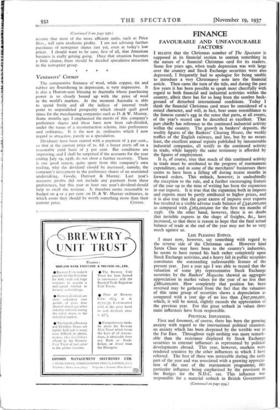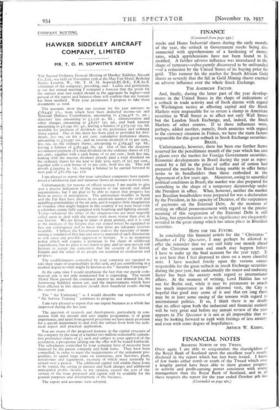FINANCE
FAVOURABLE AND UNFAVOURABLE FACTORS'
I BELIEVE that the Christmas number of The Spectator is supposed in its financial section to contain something in the nature of a financial Christmas card for its readers. Some few years ago, when trade depression was writ large over the country and Stock Exchange securities were also depressed, I frequently had to apologise for being unable to introduce a very Christmassy note into the financial article. Then came the turn of the tide, and during the past few years it has been possible to speak most cheerfully with regard to both financial and industrial activities within the country, albeit there has for so long been the sombre back- ground of disturbed international conditions. Today I think the financial Christmas card must be considered of a mixed character, and will, in fact, bear some resemblance to the famous curate's egg in the sense that parts, at all events, of the year's record can be described as excellent. That part chiefly has reference to the continued industrial activity within the country. The growth in bankers' deposits, the weekly figures of the Bankers' Clearing House, the weekly traffics of the English railways, and last, but by no means least, the excellent annual reports published by innumerable industrial companies, all testify to the continued activity in trade, while happily the same testimony is afforded by the figures of employment.
It is, of course, true that much of this continued activity in trade must be attributed to the progress of rearmament expenditure, and in some of the merchants' businesses there seems to have been a falling off during recent months in forward orders. This setback, however, is undoubtedly the exception to the rule, and a further encouraging feature of the year up to the time of writing has been the expansion in our exports. It is true that the expansion both in imports and exports must be partly attributed to higher prices, and it is also true that the great excess of imports over exports has resulted in a visible adverse trade balance of £340,000,000 as compared with k263,000,000 for the first ten months of 1936. On the other hand, however, there is no doubt that invisible exports in the shape of freights, &c., have increased, so that there is reason to hope that the final actual balance of trade at the end of the year may not be so very much against us.
LESS PLEASING EVENTS.
I must now, however, say something with regard to the reverse side of the Christmas card. However kind Santa Claus may have been to the country's industries, he seems to have turned his back rather completely upon Stock Exchange activities, and a heavy fall in public securities constitutes the outstanding unfavourable feature of the present year. Just a year ago I was able to record that the valuation of some 365 representative Stock Exchange securities by the Bankers' Magazine showed an aggregate appreciation in market values for the year of no less than £680,000,000. How completely that position has been reversed may be gathered from the fact that the valuation of this same group of securities shows a depreciation as compared with a year ago of no less than L697,000poo,, which, it will be noted, slightly exceeds the appreciation of the previous year. For this great setback in values three main influences have been responsible.
POLITICAL INFLUENCES.
First and foremost, of course, there has been the growing anxiety with regard to the international political situation, an anxiety which has been deepened by the terrible war in the Far East. Throughout -1936 nothing was more remark- able than the resistance displayed by Stock Exchange securities to external influences as represented by political developments abroad. This year, however, markets were rendered sensitive by the other influences to which I have referred. The first of these was noticeable during the early part of the year and was associated with a growing apprecia- tion of the cost of the rearmament programme, this particular influence being emphasised by the provision in the Budget for the N.D.C. tax. This influence was responsible for a material setback in British Government
(Continued on page 934.)
FINANCE
(Continued from page 932.) stocks and Home Industrial shares during the early months of the year, the setback in Government stocks being also connected with apprehensions of a hardening of money rates, which apprehensions have not been found to be justified. A further adverse influence was introduced in the shape of rumours—subsequently discovered to be unfounded —of a reduction by the United States of its buying price for gold. This rumour hit the market for South African Gold shares so severely that the fall in Gold Mining shares exerted an adverse influence over the whole Stock Exchange.
THE AMERICAN FACTOR.
And, finally, during the latter part of the year develop- ments in the United States in the shape of indications of a setback in trade activity and of fresh alarms with regard to Washington tactics as affecting capital and the Stock Markets were responsible for so severe a slump in American securities in Wall Street as to affect not only Wall Street but the London Stock Exchange, and, indeed, the Stock Markets of other centres. If to those influences were, perhaps, added another, namely, fresh anxieties with regard to the currency situation in France, we have the main factors responsible for this great setback in Stock Exchange securities.
BRAZIL.
Unfortunately, however, there has been one further factor reserved for the penultimate month of the year which has cast a gloom over the market for Foreign Government securities. Economic developments in Brazil during the year as repre- sented by a fall in the price of coffee and of cotton had prepared the markets for Brazil being unable to offer better terms to its bondholders than those embodied in the Agreement of a few years ago. Moreover, owing to unsettled political conditions in Brazil, the market was also prepared for something in the shape of a temporary dictatorship under the President in office. What, however, neither the market nor Brazilian bondholders were prepared for was a declaration by the President, in his capacity of Dictator, of the su4Sension of paYments on the External Debt. At the moment of writing an official pronouncement with regard to the precise meaning of this suspension of the External Debt is still lacking, but apprehensions as to its significance are eloquently revealed in the great slump which has taken place in Brazilian securities.
HOPE FOR THE FUTURE.
In concluding this financial article for the " Christmas " Number a,f The Spectator, I may perhaps be allowed to offer the reminder that we are still fully one month ahead of the Christmas season and much may happen before I have to make up the final account for the year 1937. It is just here that I feel disposed to close on a more cheerful note. I have touched briefly upon the various causes responsible for the great setback in Stock Exchange securities during the past year, but undoubtedly the major and enduring factor has been the anxiety with regard to international affairs. At the moment of writing, Lord Halifax has set out for Berlin and, while it may be premature to attach too much importance to this informal visit, the City is hopeful that good may come of it and that ere long there may be at least some easing of the tension with regard to international politics. If so, I think there is no doubt that its effect upon both the industrial and financial outlook will be very great and before my. annual review of the year appears in The Spectator it is not at all impossible that we may be looking forward to 1938 with feelings of less anxiety and even with some degree of hopefulness.
ARTHUR W. KIDDY.

















































































































 Previous page
Previous page